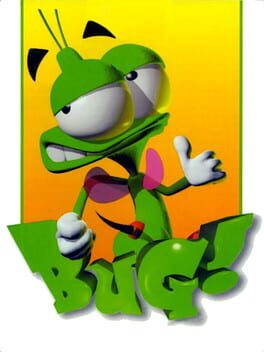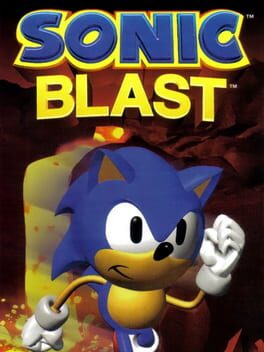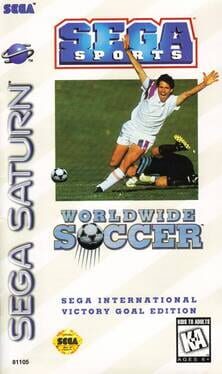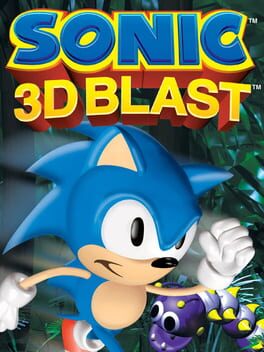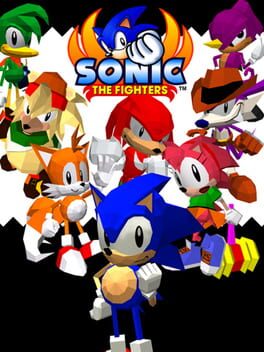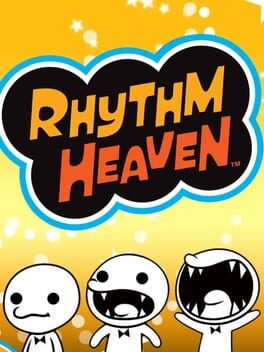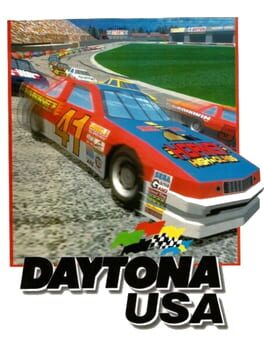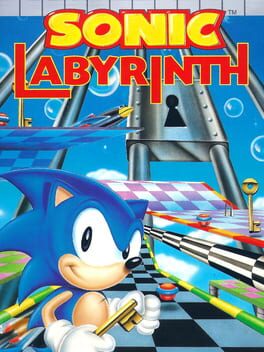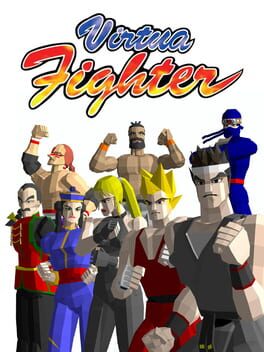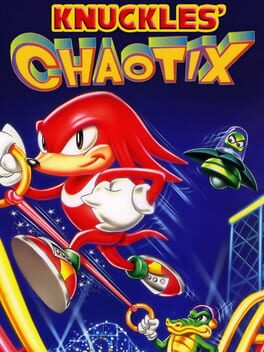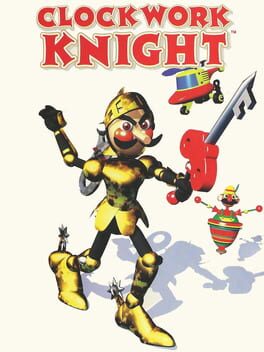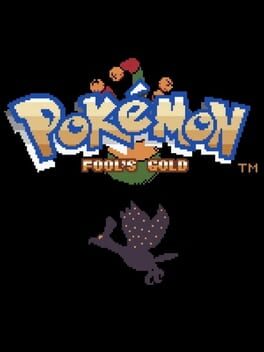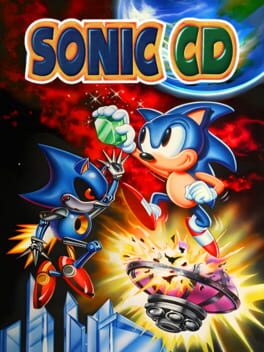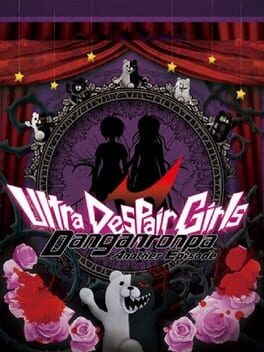tyketyke
BACKER
102 Reviews liked by tyketyke
Bug!
1995
US Saturn Release #007 - Bug!
Played on a real American Sega Saturn with the Fenrir ODE
Bug is kind of a hard game for me to rank because of how your experience can change with practice. I've played Bug a couple times recently, and I've gotten a lot better at the game, so I hardly feel frustrated with it anymore. Then again, that obviously does not remove the terrible level designs and bullshit segments. However even if I'm not getting mad at all, I'm not having lots of fun, either. It's just kind of mediocre when you get good. On the opposite end, it's horribly frustrating when played for the first time.
The most important thing for you to do is to play the Japanese version if you wish to play this game. The japanese version is much better balanced for newcomers, with Bug getting 5 lives on startup, infinite save reloads, more hit points, more checkpoints, and a better camera. That again does not obscure the level design and the terribly maintained difficulty curve, but it makes the whole thing less stressful.
Considering history, I shouldn't be too hard on Bug. This is possibly one of the first 3D platform games, and if not, at least one that came out before Super Mario 64. Standing at 3D platforming's beginnings can be difficult for development since there's not a lot of groundwork laid out for you considering what a 3D platformer should be. The developers make a lot of mistakes on that route but I can commend them for trying and succeeding in some cases. I admit, Worlds 2, 4, and 6 are pretty fun. It feels like the later in the game you get, the better the designers got at making levels (for the most part. World 5 has a lot of really frustrating segments you essentially have to memorize how to do without doing trial and error, draining your lives).
Dip into the first couple worlds on the Japanese version if you have a Fenrir or some other ODE for your Saturn (or if your computer is good enough for full speed Saturn emulation). Otherwise, I do not recommend you play this one.
4/10
Played on a real American Sega Saturn with the Fenrir ODE
Bug is kind of a hard game for me to rank because of how your experience can change with practice. I've played Bug a couple times recently, and I've gotten a lot better at the game, so I hardly feel frustrated with it anymore. Then again, that obviously does not remove the terrible level designs and bullshit segments. However even if I'm not getting mad at all, I'm not having lots of fun, either. It's just kind of mediocre when you get good. On the opposite end, it's horribly frustrating when played for the first time.
The most important thing for you to do is to play the Japanese version if you wish to play this game. The japanese version is much better balanced for newcomers, with Bug getting 5 lives on startup, infinite save reloads, more hit points, more checkpoints, and a better camera. That again does not obscure the level design and the terribly maintained difficulty curve, but it makes the whole thing less stressful.
Considering history, I shouldn't be too hard on Bug. This is possibly one of the first 3D platform games, and if not, at least one that came out before Super Mario 64. Standing at 3D platforming's beginnings can be difficult for development since there's not a lot of groundwork laid out for you considering what a 3D platformer should be. The developers make a lot of mistakes on that route but I can commend them for trying and succeeding in some cases. I admit, Worlds 2, 4, and 6 are pretty fun. It feels like the later in the game you get, the better the designers got at making levels (for the most part. World 5 has a lot of really frustrating segments you essentially have to memorize how to do without doing trial and error, draining your lives).
Dip into the first couple worlds on the Japanese version if you have a Fenrir or some other ODE for your Saturn (or if your computer is good enough for full speed Saturn emulation). Otherwise, I do not recommend you play this one.
4/10
Sonic Blast
1996
US Saturn Release #006 - Worldwide Soccer: Sega International Victory Goal Edition
Played on a real American Sega Saturn with the Fenrir ODE
Again, not a sports guy. I can't comment much on sport-specific intricacies and I won't be very drawn by default. Regardless, I think this is a pretty ok game. Pretty much everything I expected to be present worked (comfortable passing and shooting, along with decent character changing). This game is really easy to jump into and learn as you play. I set the opponents to easy and picked a short game to try everything out, and I got the hang of it quickly. For Soccer fans, this is just Soccer, in a good way.
Keep in mind there's other things I haven't played with like manual goalies and possible offensive and defensive strategies / positions (I'm probably talking out of my ass here). There's whole tournament modes here you can pick at over time. This is definitely a good Soccer game to pick up if you're in the market for a soccer Saturn game. For people like me who are not as interested, it's acceptable to skip, however there's really no harm in giving it a go. It's a pretty fun game if you ease yourself into it, it's just not going to blow you away.
6/10
Played on a real American Sega Saturn with the Fenrir ODE
Again, not a sports guy. I can't comment much on sport-specific intricacies and I won't be very drawn by default. Regardless, I think this is a pretty ok game. Pretty much everything I expected to be present worked (comfortable passing and shooting, along with decent character changing). This game is really easy to jump into and learn as you play. I set the opponents to easy and picked a short game to try everything out, and I got the hang of it quickly. For Soccer fans, this is just Soccer, in a good way.
Keep in mind there's other things I haven't played with like manual goalies and possible offensive and defensive strategies / positions (I'm probably talking out of my ass here). There's whole tournament modes here you can pick at over time. This is definitely a good Soccer game to pick up if you're in the market for a soccer Saturn game. For people like me who are not as interested, it's acceptable to skip, however there's really no harm in giving it a go. It's a pretty fun game if you ease yourself into it, it's just not going to blow you away.
6/10
Sonic 3D Blast
1996
I was expecting this to suck ass but there were plenty of levels that I thought were really fun. Isometric platforming in this game is indeed horrid, but there's not a lot of it. It's mostly wide open spaces to run around with floor gimmicks you need to navigate.
Some bosses can be really frustrating because you hardly know if you'll get to where you want to be in the isometric view, but it's not a deal-breaker.
I didn't play the DX release, but i recommend going for that, because this is worth your time given a couple tweaks and a break in the middle.
6/10
Some bosses can be really frustrating because you hardly know if you'll get to where you want to be in the isometric view, but it's not a deal-breaker.
I didn't play the DX release, but i recommend going for that, because this is worth your time given a couple tweaks and a break in the middle.
6/10
Sonic the Fighters
1996
I've seen that this is a fighting game which has depth, it's just kind of for me to get into it. The story mode is okay I guess, but it doesn't really feel fun with so much rubber banding (then again you're granted that rubber-banding too). You should definitely play this, but don't expect the best thing ever.
6/10
6/10
US Saturn Release #005 - Pebble Beach Golf Links
Played on a real American Sega Saturn with the Fenrir ODE
Not a sports guy. If you're looking at the lower score and questioning it, it's because this is not my kind of thing, not that this is a bad golf game. From the little I played today, I can confidently say that there's plenty here to get attached to if you're a big golf guy. It's also relatively inviting for beginners like myself, so it's easy to jump into.
My only major critique is that this game is very unattractive visuals-wise. I'm certain the Saturn can produce better visuals for a golf game than this. Maybe this also being a 3DO game means that they tried to directly port visuals and gameplay to the Saturn to cut down on time, but I haven't looked at 3DO footage so I don't know.
I will say, the most entertaining part was the cutscenes/FMVs. If you have an ODE or a computer that can run Saturn emulation well, I recommend grabbing a ROM of this and just watching them. It's really entertaining.
So if you're into golf, I say give it a shot. If you're like me and don't really gravitate towards sports titles often, it's reasonable to skip. My score likely will not reflect your score, so give it a go if it really interests you.
5/10
Played on a real American Sega Saturn with the Fenrir ODE
Not a sports guy. If you're looking at the lower score and questioning it, it's because this is not my kind of thing, not that this is a bad golf game. From the little I played today, I can confidently say that there's plenty here to get attached to if you're a big golf guy. It's also relatively inviting for beginners like myself, so it's easy to jump into.
My only major critique is that this game is very unattractive visuals-wise. I'm certain the Saturn can produce better visuals for a golf game than this. Maybe this also being a 3DO game means that they tried to directly port visuals and gameplay to the Saturn to cut down on time, but I haven't looked at 3DO footage so I don't know.
I will say, the most entertaining part was the cutscenes/FMVs. If you have an ODE or a computer that can run Saturn emulation well, I recommend grabbing a ROM of this and just watching them. It's really entertaining.
So if you're into golf, I say give it a shot. If you're like me and don't really gravitate towards sports titles often, it's reasonable to skip. My score likely will not reflect your score, so give it a go if it really interests you.
5/10
Rhythm Heaven
2008
While going through Warioware: Touched! last year, I had my fair share of criticisms, mainly that the game felt somewhat trivial since every microgame was some form of poke + drag (or in the case of the mic games, just yelling til I won). On a surface level, it would appear that the other major Nintendo minigame collection series, Rhythm Heaven, falls into the same trap, since every game appears to be tap and flick, but I don't find that to be true. Quite the opposite in fact, as Rhythm Heaven DS is extremely challenging, yet super satisfying and fair.
Rhythm Heaven succeeds where I think Warioware: Touched! falls flat, because the former is much more subtle about mixing up devices to introduce an organic difficulty curve than the latter. Every minigame's gimmick is conveyed via some combination of call & response, memorizing rhythmic motifs, and recognizing appropriate audio & visual cues. This difficulty then gets ramped up, both within minigames and throughout the game's progression, by introducing new or different elements that alter how the mechanics are presented and utilized in some fashion, but ultimately retaining the core fundamentals. For instance, you might have to play "in the dark" for certain sections of minigames and rely heavily upon audio cues, or have to deal with sudden (yet firmly telegraphed) tempo shifts with tougher rhythmic variations, or even shift the backing melody or player actions to the off-beat to keep the player honest and in-tune with the minigame's workings. This, combined with the simple yet realized controls of tap, hold, and flick (lending itself naturally to syncopation from tap/hold + flick alongside quick note playing from tapping) allows for a much more robust toolkit and strengthened intricate designs for a broadly diversified minigame ecosystem. Even if all these different rhythm games revolve around the same theme (i.e. finding the natural flow and beat in simple and often mundane tasks), they all manage to stand out from one another despite seemingly simple controls because the rhythms at which they are executed from one another can be so drastically varied and iterated upon.
The attention to detail is especially evident within the remix microgames at the end of each five game minigame chain. These finales add a fresh coat of paint to the previous four microgames (and once you get past the initial 30, sometimes even more than just four) and putting players' execution and knowledge banks to the test while ferrying them between the different concepts with ease. There's an overlying melody to the whole affair, just played with a different filter for each specific minigame type, and moreover, they're linked in a way where the players can recognize the carried-over beat and be in specific positions where they're ready to quickly adapt to the new control scheme. For instance, consider Remix 8: the ping-pong into vegetable slice looks intimidating at first, but once you realize that swiping the paddle in the former has the exact same rhythm as swiping to slice vegetables in the latter, then it's merely a case of recognizing the visual/audio disguise and maintaining your composure. Another example that comes to mind is within Remix 10, where there's a section transitioning from the snowboarding minigame to the choir kids' Glee Club. Normally, you'd think that there would be some issues immediately flashing into Glee Club, since you can't possibly know what's coming up without prior experience and not holding your stylus on the screen will result in your Choir Kid automatically singing as per the control scheme of hold and release to play notes. However, this is accounted for with the lead-in snowboard minigame, because the last few frames of that section telegraph a jump, which requires the player to hold down the stylus on the screen and then flick and release. Since the jump hasn't occurred yet, the player should still be holding down, and this transitions naturally into the Glee Club's neutral state, where they can then release the stylus to the telegraphed beat and proceed onwards. It's little moments like these that make all the different jumps between previous minigames feel seamless, and transform the remixes into challenging, yet extremely fulfilling victory laps.
My only outstanding complaint is that certain minigames require considerably more accuracy and precision to master than others, and are often far more finicky about their timing requirements without obvious visual/audible feedback regarding slight misses, which can make repeated plays for that Superb/Perfect ranking a bit obnoxious. Glee Club and Moai Doo-Wop 2 are two of the more infamous culprits, to where some users have even created strategy guides. I can certainly relate, as it took me over 8 tries on Glee Club to snag a superb before I realized that the tight timing during the quick notes in the middle of the track was the section that was stumping me, since being off by just a hair there doesn't result in the other Choir Kids giving you the stink-eye. As a related aside, I did have a bit of difficulty with Rockers 2, since this minigame introduces the use of the L/R button as a whammy bar and feels a bit out of place, being the only minigame that doesn't exclusively use the touchscreen and forcing me to bend my left hand around to access the button. That said, I'll choose to chalk that one up to a skill issue since the unlockable Technical Guitar Course afterwards gives you plenty more opportunities to get used to this mechanic. Regardless, I find Rhythm Heaven to be a very honest and approachable set of minigames despite the level of mastery often required, and I can easily see myself coming back to this one to spend more time honing my skills. It's a complete and realized package that's truly the epitome of doing a lot with very little, and I eagerly look forward to testing my mettle with the remaining games in the series.
Rhythm Heaven succeeds where I think Warioware: Touched! falls flat, because the former is much more subtle about mixing up devices to introduce an organic difficulty curve than the latter. Every minigame's gimmick is conveyed via some combination of call & response, memorizing rhythmic motifs, and recognizing appropriate audio & visual cues. This difficulty then gets ramped up, both within minigames and throughout the game's progression, by introducing new or different elements that alter how the mechanics are presented and utilized in some fashion, but ultimately retaining the core fundamentals. For instance, you might have to play "in the dark" for certain sections of minigames and rely heavily upon audio cues, or have to deal with sudden (yet firmly telegraphed) tempo shifts with tougher rhythmic variations, or even shift the backing melody or player actions to the off-beat to keep the player honest and in-tune with the minigame's workings. This, combined with the simple yet realized controls of tap, hold, and flick (lending itself naturally to syncopation from tap/hold + flick alongside quick note playing from tapping) allows for a much more robust toolkit and strengthened intricate designs for a broadly diversified minigame ecosystem. Even if all these different rhythm games revolve around the same theme (i.e. finding the natural flow and beat in simple and often mundane tasks), they all manage to stand out from one another despite seemingly simple controls because the rhythms at which they are executed from one another can be so drastically varied and iterated upon.
The attention to detail is especially evident within the remix microgames at the end of each five game minigame chain. These finales add a fresh coat of paint to the previous four microgames (and once you get past the initial 30, sometimes even more than just four) and putting players' execution and knowledge banks to the test while ferrying them between the different concepts with ease. There's an overlying melody to the whole affair, just played with a different filter for each specific minigame type, and moreover, they're linked in a way where the players can recognize the carried-over beat and be in specific positions where they're ready to quickly adapt to the new control scheme. For instance, consider Remix 8: the ping-pong into vegetable slice looks intimidating at first, but once you realize that swiping the paddle in the former has the exact same rhythm as swiping to slice vegetables in the latter, then it's merely a case of recognizing the visual/audio disguise and maintaining your composure. Another example that comes to mind is within Remix 10, where there's a section transitioning from the snowboarding minigame to the choir kids' Glee Club. Normally, you'd think that there would be some issues immediately flashing into Glee Club, since you can't possibly know what's coming up without prior experience and not holding your stylus on the screen will result in your Choir Kid automatically singing as per the control scheme of hold and release to play notes. However, this is accounted for with the lead-in snowboard minigame, because the last few frames of that section telegraph a jump, which requires the player to hold down the stylus on the screen and then flick and release. Since the jump hasn't occurred yet, the player should still be holding down, and this transitions naturally into the Glee Club's neutral state, where they can then release the stylus to the telegraphed beat and proceed onwards. It's little moments like these that make all the different jumps between previous minigames feel seamless, and transform the remixes into challenging, yet extremely fulfilling victory laps.
My only outstanding complaint is that certain minigames require considerably more accuracy and precision to master than others, and are often far more finicky about their timing requirements without obvious visual/audible feedback regarding slight misses, which can make repeated plays for that Superb/Perfect ranking a bit obnoxious. Glee Club and Moai Doo-Wop 2 are two of the more infamous culprits, to where some users have even created strategy guides. I can certainly relate, as it took me over 8 tries on Glee Club to snag a superb before I realized that the tight timing during the quick notes in the middle of the track was the section that was stumping me, since being off by just a hair there doesn't result in the other Choir Kids giving you the stink-eye. As a related aside, I did have a bit of difficulty with Rockers 2, since this minigame introduces the use of the L/R button as a whammy bar and feels a bit out of place, being the only minigame that doesn't exclusively use the touchscreen and forcing me to bend my left hand around to access the button. That said, I'll choose to chalk that one up to a skill issue since the unlockable Technical Guitar Course afterwards gives you plenty more opportunities to get used to this mechanic. Regardless, I find Rhythm Heaven to be a very honest and approachable set of minigames despite the level of mastery often required, and I can easily see myself coming back to this one to spend more time honing my skills. It's a complete and realized package that's truly the epitome of doing a lot with very little, and I eagerly look forward to testing my mettle with the remaining games in the series.
Daytona USA
1995
US Saturn Release #003 - Daytona USA
Played on a real American Sega Saturn with the Fenrir ODE
Daytona USA is just so fucking fun, man. I don't have a whole lot to really add to that, honestly. It just feels perfect whenever I play it and even though I eat shit all the time on the harder turns, I'm constantly motivated to try it again because the whole thing is just so much fun. Nailing a tough turn and blasting through at top speed is truly a feeling you can struggle to capture in modern racers.
Though, I won't act like this is some perfect port. You don't need to be a rocket scientist to notice that this port is a severe graphical downgrade. Usually it's not that big of a deal because it generally plays like the arcade cabinet, but sometimes it does effect the playing experience with lag and lower frame-rates. Also, I just kind of think the pop-in is ugly. However, that's about it when it comes to big flaws.
The soundtrack is also surprisingly better than the arcade game. Since the game is on a disc, it can do these songs more naturally compared to the arcade game which had to deliver its vocals through a string of samples. The arcade game's samples are charming, but I do think this is better overall.
This is a must-have, must-play Sega Saturn title. It has its evident failings, but at its heart, it's a wonderful arcade port that you'll gladly sink hours into. This is a perfect boredom killer. Never a dull moment.
8/10
Played on a real American Sega Saturn with the Fenrir ODE
Daytona USA is just so fucking fun, man. I don't have a whole lot to really add to that, honestly. It just feels perfect whenever I play it and even though I eat shit all the time on the harder turns, I'm constantly motivated to try it again because the whole thing is just so much fun. Nailing a tough turn and blasting through at top speed is truly a feeling you can struggle to capture in modern racers.
Though, I won't act like this is some perfect port. You don't need to be a rocket scientist to notice that this port is a severe graphical downgrade. Usually it's not that big of a deal because it generally plays like the arcade cabinet, but sometimes it does effect the playing experience with lag and lower frame-rates. Also, I just kind of think the pop-in is ugly. However, that's about it when it comes to big flaws.
The soundtrack is also surprisingly better than the arcade game. Since the game is on a disc, it can do these songs more naturally compared to the arcade game which had to deliver its vocals through a string of samples. The arcade game's samples are charming, but I do think this is better overall.
This is a must-have, must-play Sega Saturn title. It has its evident failings, but at its heart, it's a wonderful arcade port that you'll gladly sink hours into. This is a perfect boredom killer. Never a dull moment.
8/10
Sonic Labyrinth
1995
Virtua Fighter
1993
US Saturn Release #001 - Virtua Fighter
Played on a real American Sega Saturn with the Fenrir ODE
As a port of the arcade version of Virtua Fighter, this is an incredible showcase for the Saturn. It really doesn't age wonderfully in the visuals department, but I hardly think that matters. My only critique on the visuals is that there's a lot of flickering polygons in the character models, and sometimes to the game maps go a little crazy when you jump around. It's like the game camera doesn't know how to properly display the playfield when you do that.
The gameplay itself feels really weird though, which is kind of sad. I think the game tried to be a lot more realistic, at least closer to real martial arts in comparison to something like Mortal Kombat or Street Fighter. I feel like that just made it harder for me to play it though. Stuff like manually turning around and lows not blocking mids like the games I'm used to playing. Also, I had a seriously hard time getting special moves and grabs out. I don't know if it's just me not being good or that this game functions differently input-wise to other fighters. I'm not excellent at fighting games but I have an ok time adapting and pulling off moves. Here, I could barely do anything.
It was very fristrating, but part of me feels like it's just me being bad at the game rather than the game just being poorly executed. I would have loved to train, but there really isn't a training mode here. You can try to train in the arcade mode, but I feel like the A.I. gets too hard too quickly. It even tries to cheese you by jumping around when the clock runs low, trying to time you out. Surely you can cheese it back, but I really don't know how to yet. You could also jump into the VS mode alone, fighting a static opponent, but that didn't help me out much either.
I'm being rather critical, but I understand that this was kind of a big deal at the time. I also understand that I'm struggling to enjoy it partly because I'm playing solo, when fighters are at their most fun when you're playing with friends. I'm sure if I was playing with friends, I would have bumped this up a couple points. But as it stands now, this didn't really do much for me for the time I played it.
5/10
I really think you should try it out. You might not like it but you might find more here than I did. Just be sure to play with somebody else if you can.
Played on a real American Sega Saturn with the Fenrir ODE
As a port of the arcade version of Virtua Fighter, this is an incredible showcase for the Saturn. It really doesn't age wonderfully in the visuals department, but I hardly think that matters. My only critique on the visuals is that there's a lot of flickering polygons in the character models, and sometimes to the game maps go a little crazy when you jump around. It's like the game camera doesn't know how to properly display the playfield when you do that.
The gameplay itself feels really weird though, which is kind of sad. I think the game tried to be a lot more realistic, at least closer to real martial arts in comparison to something like Mortal Kombat or Street Fighter. I feel like that just made it harder for me to play it though. Stuff like manually turning around and lows not blocking mids like the games I'm used to playing. Also, I had a seriously hard time getting special moves and grabs out. I don't know if it's just me not being good or that this game functions differently input-wise to other fighters. I'm not excellent at fighting games but I have an ok time adapting and pulling off moves. Here, I could barely do anything.
It was very fristrating, but part of me feels like it's just me being bad at the game rather than the game just being poorly executed. I would have loved to train, but there really isn't a training mode here. You can try to train in the arcade mode, but I feel like the A.I. gets too hard too quickly. It even tries to cheese you by jumping around when the clock runs low, trying to time you out. Surely you can cheese it back, but I really don't know how to yet. You could also jump into the VS mode alone, fighting a static opponent, but that didn't help me out much either.
I'm being rather critical, but I understand that this was kind of a big deal at the time. I also understand that I'm struggling to enjoy it partly because I'm playing solo, when fighters are at their most fun when you're playing with friends. I'm sure if I was playing with friends, I would have bumped this up a couple points. But as it stands now, this didn't really do much for me for the time I played it.
5/10
I really think you should try it out. You might not like it but you might find more here than I did. Just be sure to play with somebody else if you can.
Knuckles' Chaotix
1995
Fantastic music, outstanding visuals, just not that wonderful of a playing experience. Going for the chaos rings was kind of a slog, but keep in mind this is my first time playing. I think if I put more time into this I'll find these setbacks more passable. Don't play this game in one sitting, that's hellish.
7/10
Vector Cock Rings
7/10
Vector Cock Rings
Clockwork Knight
1994
US Saturn Release #002 - Clockwork Knight
Played on a real American Sega Saturn with the Fenrir ODE
Clockwork Knight is a platformer that does most things very well. The controls are responsive, the actual physics of your character are comfortable to work with, levels are designed well enough to not be frustrating and each contains enough to stand out. However, Clockwork Knight also lacks challenge, and is extremely short. That's not bad, per say, but it prevents this game from really reaching the heights of action platforming you see in Castlevania, Mega Man, and Mario.
The benefit of those issues is that this game is super easy to jump into and it's super comfortable to run through. Nothing feels unfair but for someone like me, nothing feels exciting either.
I really enjoyed the visuals. This game demonstrates early that the Sega Saturn was well suited for 2D games. This takes a lot of what Donkey Kong Country did and runs with it in 32 bits. more colors, fully polygonal boss fights and levels, and no slowdown. It's not the kind of game that immediately stuns you with its visuals, but definitely shows off the Saturn's 2D potential.
Despite my gripes about difficulty and length, I do appreciate how everything is designed. There really are no bad levels. The whole thing of playing as a toy is used rather well in designing both how stages look and how they play (for example, the kitchen level is like an ice level, with extra polished kitchen counters, and the sink provides as a rising-falling water hazard level).
Clockwork Knight is certainly creative and well designed for pretty much anybody to jump into, but as someone who loves platformers and has played many of them, this doesn't really compare to most others. This is definitely a game I recommend playing, and it's very good, but I wouldn't expect anything amazing.
7/10
Played on a real American Sega Saturn with the Fenrir ODE
Clockwork Knight is a platformer that does most things very well. The controls are responsive, the actual physics of your character are comfortable to work with, levels are designed well enough to not be frustrating and each contains enough to stand out. However, Clockwork Knight also lacks challenge, and is extremely short. That's not bad, per say, but it prevents this game from really reaching the heights of action platforming you see in Castlevania, Mega Man, and Mario.
The benefit of those issues is that this game is super easy to jump into and it's super comfortable to run through. Nothing feels unfair but for someone like me, nothing feels exciting either.
I really enjoyed the visuals. This game demonstrates early that the Sega Saturn was well suited for 2D games. This takes a lot of what Donkey Kong Country did and runs with it in 32 bits. more colors, fully polygonal boss fights and levels, and no slowdown. It's not the kind of game that immediately stuns you with its visuals, but definitely shows off the Saturn's 2D potential.
Despite my gripes about difficulty and length, I do appreciate how everything is designed. There really are no bad levels. The whole thing of playing as a toy is used rather well in designing both how stages look and how they play (for example, the kitchen level is like an ice level, with extra polished kitchen counters, and the sink provides as a rising-falling water hazard level).
Clockwork Knight is certainly creative and well designed for pretty much anybody to jump into, but as someone who loves platformers and has played many of them, this doesn't really compare to most others. This is definitely a game I recommend playing, and it's very good, but I wouldn't expect anything amazing.
7/10
Pokémon: Fool's Gold
2020
Pokemon fools gold is a hack that changes every pokemon into a mandela effect version of themselves. it's a concept that's familiar enough for me to enjoy breezing through it, but different enough for me to feel excited (or disturbed) everytime i see a new pokemon! I love a lot of the new forms, but my favs would prolly be persian, they're so cute!
Sonic CD
1993
I fucking love Sonic CD. I understand why some think it's kind of rough, but I think the whole experience is just pure fun. The levels are big but they're fun to run through and explore. The special stages are fucking amazing and I love playing them every time. The metal sonic race is just peak. The japanese soundtrack is funky shit. It's just amazing. I can't think of much that I actually don't like. Maybe Wacky Workbench? I still don't really hate that level it's just kind of annoying.
9/10
9/10
A monstrosity of a game that not only manages to have mediocre third person shooter gameplay with a game-breaking gimmick when upgraded to grind for ammo and hearts. Not only that, but the controls also sucked. In addition to this, characters, story, and comedy that fall utterly flat on its face. The writing is a fucking mess where in it pull many trigger warnings such as rape, abuse, and sexual assault mentions for children but then proceeds to sexualize one of the children. Not to mention it presents you with a minigame where its main objective is to not get groped, and not fill the "obedience meter"; it thinks it's really funny using a minigame that's close to rape and it shows how awful this game is. In early chapters the story was fine, but then it shows you show much uncomfortable stuff in the form of voice acting and cgs to accompany it so it's definitely the darkest game in the series. Oh yeah, also fuck whoever wrote Haiji and thought his character was acceptable. I don't know why he sticks around with you in the game, but I knew character writing was thrown out the window when the first introduction to him was a statement about him being into lolicon. Way too many fanservice jokes in this game too such as Genocide Jack being able to cut your clothes off in a battle against her; I would spoiler this, but it's better if people were saved from the unknown details contained here. The only characters that mattered here were Komaru and Toko if you want to know from my opinion. The only reason why this is not a total 0 star rating is due to the lore expansion and Toko's character who I was happy to go through with. If you want to play this for the lore of the Danganronpa universe god help you then.
